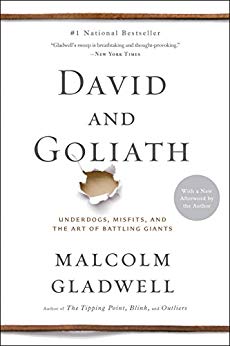

This article is an excerpt from the Shortform summary of "David and Goliath" by Malcolm Gladwell. Shortform has the world's best summaries of books you should be reading.
Like this article? Sign up for a free trial here .
For thousands of years, the Biblical David and Goliath story has given hope to underdogs inspired by David’s miraculous victory against the giant Goliath, with only a rock, sling, and stick at his disposal. The odds were against David…or were they?
In David and Goliath, Malcolm Gladwell argues that we misunderstand the David and Goliath story particularly and underdog victories in general. Keep reading to learn why you’ve been getting the moral of this story wrong, and what the real takeaways are.
Overview: The David and Goliath Story
In the Valley of Elah, the Philistines want to capture the land ruled by the Israelites. The Philistines send their strongest man, the six-foot-nine Goliath, to do battle for them. The only Israelite to volunteer to confront Goliath is a shepherd boy, David. Saul, king of Israel and Judah, offers David a sword and shield, but David refuses them and runs, unprotected, toward Goliath. He slings a rock at Goliath’s exposed forehead before Goliath can react, and as Goliath lies on the ground, stunned, David grabs his sword and kills him.
Two Sources of Misunderstanding
We think of David’s small size, shortage of weapons, and lack of battle experience as disadvantages, when these were actually crucial to his success. Gladwell shows us that our various disadvantages–from loss and grief to discrimination and disability–may be advantages in disguise. Two key ideas run through the David and Goliath story:
1. Difficulty can be desirable
- When you face seemingly insurmountable difficulties and beat the odds, you cultivate the qualities we most value in society.
- We tend to think of all challenges and deficiencies as disadvantages, but what we assume are disadvantages are often advantages. There are some traits you only develop through adversity, such as unshakable self-confidence and emotional endurance.
2. We misunderstand underdog stories
- We think that power = physical strength, size, weaponry, or wealth.
- In reality, what we assume are advantages are often disadvantages. Heavy armor may appear to protect you when it actually weighs you down. Likewise, having too much wealth and exerting too much power can hold you back.
How We Misunderstand the David and Goliath Story
We think David’s victory is miraculous, but it’s more probable than we realize.
David’s perceived disadvantages were actually advantages
- He had no armor or sword, but these would have made him clumsy because he wasn’t used to them.
- He was small, but this allowed him to be fast and agile in his attack.
- He was a lowly shepherd boy rather than an experienced fighter, but protecting his sheep gave him practice in fatally slinging rocks at lions and bears, excellent preparation for his battle with Goliath.
Goliath’s perceived advantages were actually disadvantages
- Goliath was a giant, but medical experts believe this was due to a condition called acromegaly that causes an overproduction of human growth hormone. This condition also causes vision problems, which proved fatal to Goliath, who couldn’t see what David was up to until it was too late.
- Goliath had a lot of battle experience, but these prior experiences led him to assume that David would engage with him in traditional hand-to-hand combat. By declining to follow the conventional strategies, David caught him off guard.
- Goliath was likely wearing and carrying over a hundred pounds of armor and weaponry, but this left him immobile and unable to respond to David’s unconventional tactics.
The true lesson of the David and Goliath story: If you can learn to view your “disadvantages” as advantages, you may find in yourself a source of power that makes your victory probable rather than miraculous.
———End of Preview———

Like what you just read? Read the rest of the world's best summary of "David and Goliath" at Shortform . Learn the book's critical concepts in 20 minutes or less .
Here's what you'll find in our full David and Goliath summary :
- Why being the underdog can actually be an advantage
- Why you shouldn't be afraid of powerful giants
- Strategies to get an edge when you're overpowered






